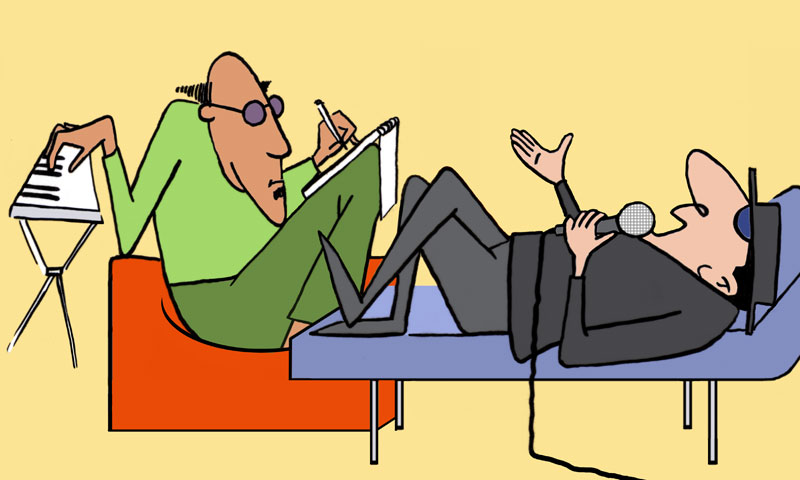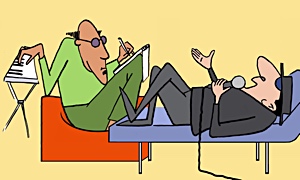Home » Jazz Articles » Mr. P.C.'s Guide to Jazz Etiquette and Bandstand Decorum » Bits and PCs, The Cosmic Loop, Fake Gigs
Bits and PCs, The Cosmic Loop, Fake Gigs

Is it ever ok for a horn player to scat? If so, what are the proper syllables for upbeats?
—Zee-bop
Dear Zee-bop:
The correct syllable for an upbeat is "and." Besides alerting the band to where you might be rhythmically, it lets the listeners know there's more to follow, giving them hope it might get better.
Dear Mr. P.C.:
I've played a few casuals where the client actually hired beautiful people just to circulate around the room being beautiful so guests would feel privileged to be in their company. My question: Doesn't that also kind of make the band look ugly?
—Homely Honker
Dear Homely:
Causality is always elusive, isn't it? Actually, they hire jazz musicians to make the beautiful people—and all the guests—look better.
Dear Mr. P.C.:
It has been said that if a roomful of monkeys randomly tapped long enough on computer keyboards, one would eventually write War and Peace. Can it also be said that if they were given saxophones, one would eventually play Coltrane's "My Favorite Things"?
—Lying Awake, Needing To Know
Dear Lying:
You're assuming that the monkeys would actually play the saxophones. More likely they'd just chatter incessantly about their mouthpieces and reeds until one of them sounded exactly like a real saxophonist.
Dear Mr. P.C.:
I'm on a trio gig, in the middle of a solo, and I'm pushing it rhythmically, superimposing different meters. Suddenly the drummer's hi-hat is on one-point-five and three-point-five instead of two and four. One of us must have turned the time around. I think, "Did I trick him, or did I trick myself?" Honestly, I have no idea, but we're playing really fast, and something needs to change in a hurry. We're both seasoned professionals who shouldn't have let this happen. My question is: Which one of us should have to adjust to the other?
—Out of Sync
Dear Out:
Since this is a trio gig, just listen to the bassist for the answer. Are you with him? Then the drummer is probably right.
Dear Mr. P.C.:
In grad school, a well-respected L.A.-based professional drummer came to guest-lead a student combo. One of my classmates asked him why older musicians seem so devoid of passion on their gigs when us young pups feel full-body convulsions of joy every time we hear an outside note. His answer was that as someone ages, every day they live is an increasingly smaller percentage of their total lifetime lived, and every gig they play is an increasingly smaller percentage of their total gigs played.
Was he right? Is there a cure to this natural law? How many gigs does a jazz musician play in their life?
—Diminishing Returns
Dear Diminishing:
If he's right, wouldn't the same logic apply within a tune? So the first note—which would be 100% of notes played to that point—would be bursting with excitement and promise. And the last note—one thousandth of the cumulative song—would be virtually meaningless; the corollary to an artist's last gig or final breath.
From this we learn that the journey from the beginning of a jazz tune to its end is essentially a process of degeneration and degradation. While some listeners may find profundity in its parallel to the human condition, most just flee to a less morbid art form.
That's why more and more jazz artists are getting into looping; after all, loops value every note equally. In the world of loops life is a circle—death isn't final, but rather a gateway to rebirth. The critics and so-called jazz "purists" who dismiss looping for falling outside the tradition reveal nothing but their own spiritual vacuum.
Dear Mr. P.C.:
When I'm booking a gig, sometimes I'll deliberately call people I know are already booked elsewhere so that they'll "owe me one." Is there anything wrong with that?
—Drum and Drummer
Dear Drum:
Let's be clear: What you're talking about is establishing a new market, one that exists in parallel to the current market of debts and obligations for real gig offers made in good faith. In your market what you'll be owed isn't just a call for a gig, but more specifically a call for a gig you can't play.
Those calls aren't only for gigs on dates where you're already working. They can include any gig you'd have to turn down—gigs you're unqualified to play, gigs where you'd have personal conflicts with other musicians, and gigs at venues that have banned you for inappropriate behavior.
Keep in mind that these non-gigs are not all created equal. If you call someone for a $200 gig they can't play, they can't repay you with a $100 gig you can't play; they'd have to call you for two of those. Likewise if you call someone for a $200 gig with great musicians at a classy venue, they can't pay you back with a $200 gig with mediocre players at a dive. But this one's tricky: Having to turn down a better gig will make you feel worse than turning down a lesser one, even though the gig itself would be a nicer experience. Your feelings have value, too, and that raises a difficult question: Which offer creates a greater debt, and how can that be assigned a more realistic monetary figure?
The good news is that you can bypass monetary equivalents altogether: Your calls don't even have to be about "real" gigs! Just find a date where a player is booked (hint: website calendars are a great resource) and make the call. Until they figure out what you're doing, you'll be owed more gigs you can't play than you'll know what to do without.
Have a question for Mr. P.C.? Ask him.
< Previous
Concert of the Century - Tribute to C...
Next >
Alaya
Comments
Tags
For the Love of Jazz
 All About Jazz has been a pillar of jazz since 1995, championing it as an art form and, more importantly, supporting the musicians who create it. Our enduring commitment has made "AAJ" one of the most culturally important websites of its kind, read by hundreds of thousands of fans, musicians and industry figures every month.
All About Jazz has been a pillar of jazz since 1995, championing it as an art form and, more importantly, supporting the musicians who create it. Our enduring commitment has made "AAJ" one of the most culturally important websites of its kind, read by hundreds of thousands of fans, musicians and industry figures every month.



















